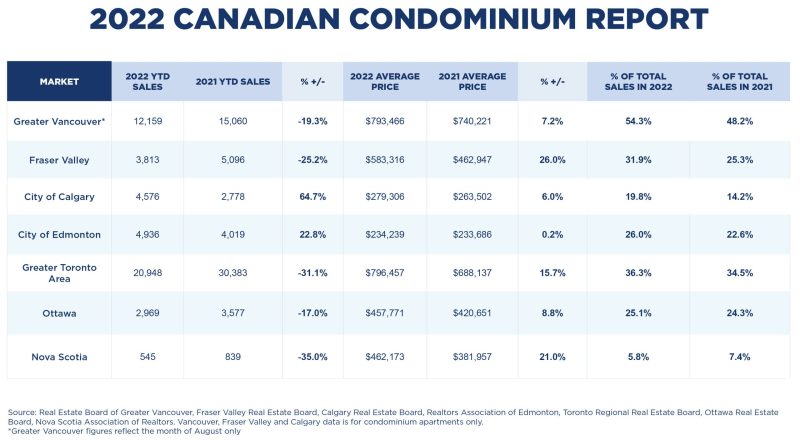The condominium sector in the Ottawa real estate market is holding relatively steady, despite rising interest rates and some softening in the overall market. Almost 3,000 units have sold between January and August of 2022, down approximately 17 per cent from the 3,577 sales reported during the same period in 2021. Year-to-date average price remains solid, up almost nine per cent to $457,771, compared to $420,651 in 2021.
Certain areas have held their own this year, including Centretown, where condominium sales are on par with year-ago levels. Lowertown Market and Old Ottawa East are slightly off last year’s pace by 2.8 per cent and 4.2 per cent respectively. The rapid appreciation of freehold properties continues to prompt would-be buyers to consider condominium ownership. Young professionals are starting to gravitate to downtown neighbourhoods such as Centretown, the Glebe and up-and-coming Old Ottawa East, which fell out of favour at the height of the pandemic. Properties that offer lower condominium fees, amenities, parking and storage lockers are most sought-after. Buildings such as 179 Metcalfe are a popular destination, with one-bedroom apartments starting between $450,000 and $475,000 and two-bedroom units priced from $630,000. Downsizing buyers are also active in the core, but prefer established communities such as the Glebe, Westboro and the Golden Triangle. In fact, there is a shortage of luxury inventory in the Glebe, especially over the $650,000 price point where units are few and far between. Much of the new inventory on the market right now is rental. Students have also returned to campus, driving demand for condominium apartments that are close to University of Ottawa and Carlton.
While buyers are mindful of the Bank of Canada’s interest rate hikes, they’re acutely aware of the change in Ottawa real estate market conditions. The shift from a seller’s market into more balanced territory has given many buyers ample room to breathe. This, at a time when a good selection of condominium product exists across various price points and neighbourhoods, sellers are more open to negotiation, and overall market conditions are more favourable. Three months of inventory is currently available for sale, and sellers have found that days on market are stretching longer. Most buyers feel that the worst is over, with some minor adjustments coming down the pipe, fluctuation should be minimal.
Condominium Trends in the Canadian Real Estate Market
Condominium market share has grown in major urban Canadian real estate markets yet again this year, a reflection of new market realities and the shifting course of entry-level buyers. RE/MAX Canada’s 2022 Canadian Condominium Report examined more than 120 communities in six major markets, including Greater Vancouver/Fraser Valley, Calgary, Edmonton, Greater Toronto, Ottawa and Nova Scotia. The report found that condominium sales were down in the first eight months of 2022 in four markets, including Greater Vancouver/Fraser Valley, Greater Toronto, Ottawa and Nova Scotia, while Calgary and Edmonton reported double-digit sales increases over the same period in 2021. Condo values are up in almost all markets year-over-year, with many bolstered by a robust strong first quarter.
Condominium market share, as a proportion of total Canadian real estate sales, advanced across the board, with upswings reported in five out of six markets analyzed, ranging from a low of 0.08 per cent in Ottawa to a high of 6.6 per cent in the Fraser Valley. Compared to year-to-date levels one year ago, condominiums now represent just over 54 per cent of total residential sales in Greater Vancouver, 36.3 per cent of residential sales in the Greater Toronto Area, almost 32 per cent of sales in the Fraser Valley, just over one in four sales in Edmonton and Ottawa, and almost one in five sales in Calgary. Nova Scotia was the only market to register a decline in condominium market share.

“The affordability factor is the key issue in today’s housing market,” says Christopher Alexander, President, RE/MAX Canada. “Rising interest rates have slowly eroded purchasing power and, despite lower housing values and cooling market conditions, buying a house is more challenging now than ever before. For those who have adjusted expectations with every rate hike, the cost of carrying a mortgage versus renting is now more comparable, given sharp double-digit increases in rental rates throughout the major markets, but especially in BC and Ontario. So, while fewer sales have occurred in 2022, condominiums represented a greater proportion of overall sales, as buyers gravitated to affordable options to achieve home ownership.”
The post Ottawa Real Estate: Condo Buyers Return Downtown appeared first on RE/MAX Canada.
